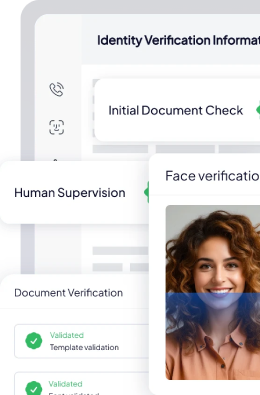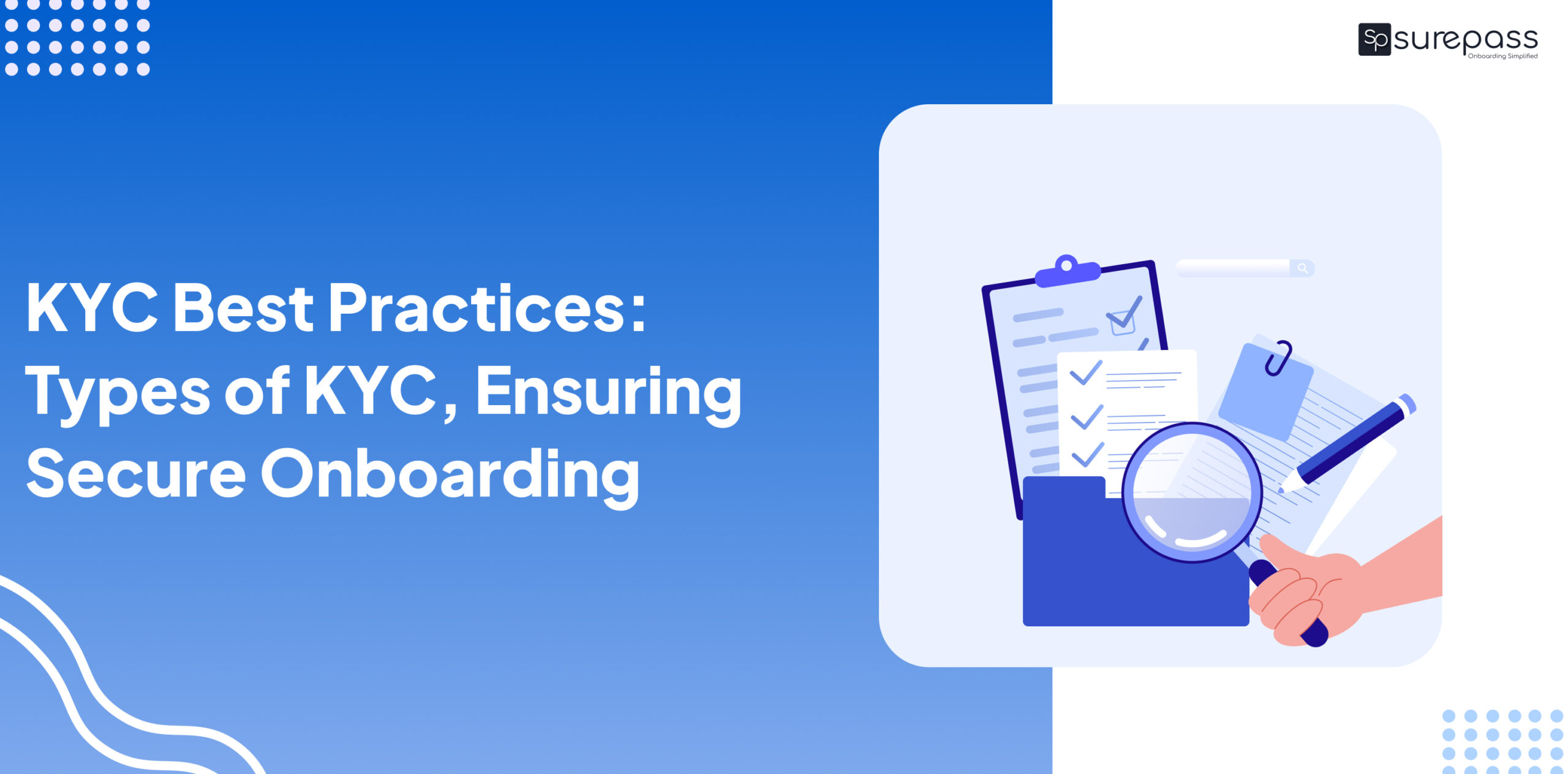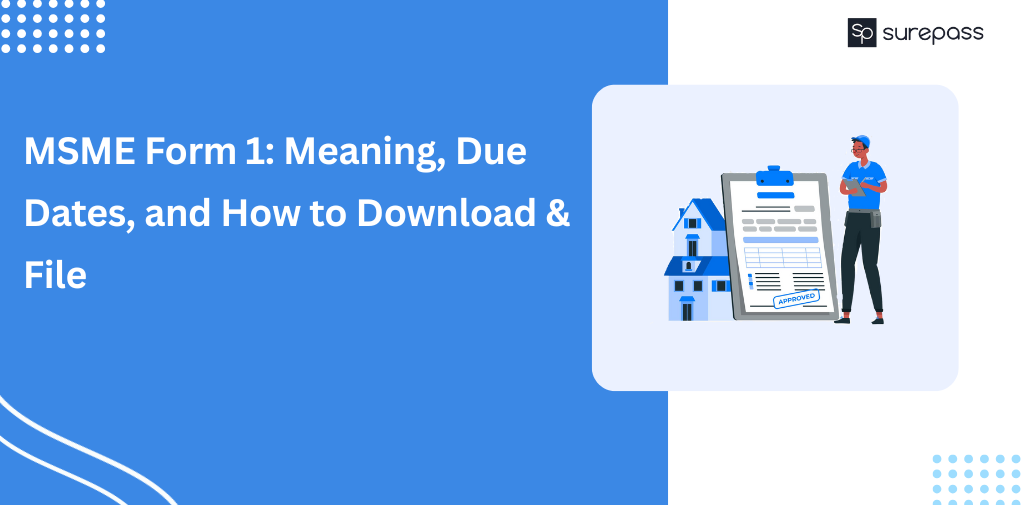Introduction
In an increasingly digital world, the importance of identity verification cannot be overstated. Whether it’s for financial transactions, online services, or even physical access, the need to confirm someone’s identity is a fundamental aspect of security and trust. This process is known as KYC, or Know Your Customer.
In this comprehensive guide, we will explore the world of KYC, starting with the basics: What is KYC? We’ll delve into the different types of KYC and their advantages, the essential KYC documents required for various modes, where KYC is needed and why, the need for KYC in different industries, and finally, the benefits of KYC for verification and onboarding. Additionally, we’ll introduce SurePass, an innovative company that simplifies the user onboarding process through Real-time ID verification APIs, Digital KYC, Document OCR, and other APIs across multiple industries.
What is KYC?
KYC, or Know Your Customer, is a process through which organizations verify the identity of their customers to ensure they are who they claim to be. The primary objective of KYC is to prevent fraud, money laundering, and other illicit activities. KYC procedures involve collecting and verifying customer information, typically including their name, address, date of birth, and official identification documents.
KYC is a crucial part of the customer onboarding process for banks, financial institutions, fintech companies, and various other industries. It helps establish trust, ensures regulatory compliance, and safeguards against financial crimes.
Automate your KYC Process & reduce Fraud!
We have helped 200+ companies in reducing their user onboarding TAT by 95%
Different Types of KYC
1. Customer Due Diligence (CDD)
CDD is the most basic form of KYC, requiring customers to provide essential information such as name, address, and date of birth. The advantages of CDD include:
- Simplicity and ease of implementation.
- Suitable for low-risk customers.
- Initial verification of customer identity.
2. Simplified Due Diligence (SDD)
SDD is applicable to customers with a low risk of money laundering or terrorist financing. Advantages of SDD include:
- Reduced documentation requirements.
- Expedited onboarding for trusted customers.
- Cost-effective for businesses.
3. Enhanced Due Diligence (EDD)
EDD is a more thorough KYC process used for higher-risk customers, such as politically exposed persons (PEPs) or businesses in high-risk sectors. Advantages of EDD include:
- In-depth customer profiling.
- Enhanced risk assessment.
- Stronger regulatory compliance.
4. Video KYC
Video KYC is a modern approach that allows customers to verify their identity through a live video call. Advantages of Video KYC include:
- Enhanced security through real-time interaction.
- Convenient for remote onboarding.
- Compliance with regulatory requirements.
5. Digital KYC
Digital KYC leverages digital technology to streamline the identity verification process. Advantages of Digital KYC include:
- Faster and more efficient onboarding.
- Reduced paperwork and manual errors.
- Enhanced customer experience.
These are some basic types of KYC, One should know.
Types of KYC APIs
Surepass, a leading API provider, offers a range of KYC-related APIs designed to simplify the user onboarding process for enterprises. These APIs cover various aspects and types of KYC and verification:
1. Real-time ID Verification or KYC
- Aadhaar Card Verification: Verifies customer identity using Aadhaar cards.
- PAN Card Verification: Validates customer details against PAN cards.
- Passport Verification: Confirms customer identity via passport verification.
- Voter ID Verification: Ensures customer authenticity through voter ID verification
- DL Verification: Validates customer driving license information.
These APIs are essential for verifying customer identity quickly and accurately, making them valuable assets for businesses across industries.
2. Real-time Merchant Verification
- Udyog Aadhaar Verification: Confirms the legitimacy of businesses using Udyog Aadhaar.
- CIN Verification: Validates company registration details using the Corporate Identification Number (CIN).
- GST Verification: Ensures GST compliance through real-time verification.
- DIN Verification: Validates Director Identification Numbers (DIN).
Merchant verification APIs are crucial for businesses engaging with other companies and require authenticating their credentials.
3. Real-time Asset Verification
- RC Verification: Confirms vehicle ownership and registration through RC verification.
Asset verification is essential in industries like insurance, lending, and financial services.
4. Real-time OCR (AI-based)
- Aadhaar: Extracts data from Aadhaar cards using Optical Character Recognition (OCR).
- PAN: Extracts data from PAN cards for quick verification.
- Driving License (DL): Extracts data from driving licenses.
- Voter ID: Extracts data from voter ID cards.
- RC: Extracts data from vehicle registration certificates.
- Cheque: Extracts data from printed checks.
OCR technology simplifies data extraction from documents, reducing manual effort and errors.
5. User On-Boarding
- Bank Account Verification: Streamlines the process of verifying bank accounts.
- ESign (Aadhaar-based): Offers electronic signature capabilities using Aadhaar.
- Video KYC (Face Match & Face Liveliness): Enhances security and compliance with video KYC.
- KRA: Provides services related to KYC Registration Agencies.
- Pay In/Pay Out: Facilitates seamless financial transactions.
User onboarding APIs help enterprises accelerate the onboarding process while ensuring compliance with regulations.
KYC Documents for Banks
The specific KYC documents may vary depending on the type of KYC and the industry. In the banking sector, for instance, the following documents are typically required:
- Proof of Identity (PoI): This can include documents like Aadhaar cards, PAN cards, passports, or voter ID cards.
- Proof of Address (PoA): Documents such as utility bills, rental agreements, or bank statements can serve as proof of address.
- Photographs: Recent passport-sized photographs of the customer.
- Income Proof: In some cases, income-related documents may be needed, such as salary slips or income tax returns.
Different modes of KYC, such as Video KYC or Digital KYC, may have specific document requirements tailored to their verification processes.
What is KYC Details?
KYC details refer to the information collected during the KYC process to establish and verify a customer’s identity. These details typically include:
- Full Name: The customer’s complete name, including any aliases or variations.
- Date of Birth: The customer’s birthdate.
- Address: The residential address of the customer.
- Government-issued ID: Details from official identification documents like Aadhaar, PAN, or passport.
- Photographs: Visual records of the customer’s appearance.
- Biometric Data: In some cases, biometric data like fingerprints or facial recognition may be collected.
- Contact Information: Phone numbers and email addresses for communication.
- KYC details are used to ensure that the customer is not involved in fraudulent activities and that their identity is accurately recorded.
Where is KYC Needed and Why?
KYC is a critical process in various industries, primarily to mitigate risks associated with identity theft, fraud, and financial crimes. Here are some key sectors where KYC is essential:
- Banking/Finance
Banks use KYC to verify the identity of account holders, detect fraudulent activities, and comply with regulations. It ensures that only legitimate customers have access to banking services.
- Lending
Lending institutions rely on KYC to assess the creditworthiness of borrowers and prevent lending to individuals with a history of default or fraud.
- Insurance
In the insurance sector, KYC helps insurers assess the risk associated with potential policyholders and ensures that claims are processed accurately.
- Aggregators
Aggregators and online platforms that facilitate transactions between users often require KYC to build trust and verify the identities of users.
- Stock/Crypto Trading
Trading platforms use KYC to ensure that traders comply with financial regulations and to prevent money laundering and fraud.
- Mutual Fund
Mutual fund companies use KYC to verify investors’ identities and ensure that they comply with regulatory requirements.
- Gaming
Online gaming platforms use KYC to create a safe and secure gaming environment, verify the age of players, and prevent fraudulent activities.
- Ride Hailing
Ride-hailing companies use KYC to verify the identities of both drivers and passengers, ensuring the safety of users.
Need for KYC in Different Industries
The need for KYC varies across industries due to differing risk profiles and regulatory requirements. Here’s a closer look at why KYC and types of KYC is vital in various sectors:
Financial Services
- Risk Mitigation: KYC helps banks and financial institutions assess the risk associated with each customer, making informed lending and investment decisions.
- Regulatory Compliance: Financial regulations require institutions to conduct due diligence on customers to prevent money laundering and fraud.
- Customer Trust: KYC builds trust with customers by demonstrating a commitment to their security and privacy.
- Insurance
- Risk Assessment: KYC helps insurance companies accurately assess the risk profile of policyholders, which affects premium rates and claim payouts.
- Fraud Prevention: Insurance fraud is a significant concern, and KYC plays a pivotal role in identifying fraudulent claims.
E-commerce and Aggregators
- Trust and Security: E-commerce platforms and aggregators need KYC to establish trust between buyers and sellers, preventing scams and fraudulent transactions.
Cryptocurrency and Fintech
- Regulatory Compliance: The cryptocurrency and fintech sectors are subject to evolving regulations. KYC is crucial for compliance and maintaining a trustworthy reputation.
- Security: KYC helps prevent illicit activities like money laundering and terrorist financing in the crypto space.
Gaming
- Age Verification: KYC ensures that online gaming platforms comply with age restrictions, preventing minors from accessing inappropriate content.
- Fair Play: KYC helps maintain a fair gaming environment by verifying the identities of players and preventing cheating.
Benefits of KYC for Verification and Onboarding
KYC offers numerous benefits to both businesses and customers:
1. Enhanced Security
KYC helps verify the identity of customers, reducing the risk of fraudulent activities and identity theft.
2. Regulatory Compliance
Businesses that conduct KYC are more likely to comply with legal and regulatory requirements, avoiding fines and penalties.
3. Improved Customer Experience
Digital KYC and streamlined onboarding processes enhance the customer experience by reducing paperwork and wait times.
4. Trust and Credibility
Customers are more likely to trust businesses that prioritize their security through KYC processes.
5. Risk Management
KYC allows businesses to assess and manage the risks associated with their customers, leading to more informed decisions.
6. Fraud Prevention
By verifying customer identities, KYC helps prevent fraudulent transactions and activities.
7. Efficient Onboarding
Streamlined KYC processes, like Video KYC and Digital KYC, make customer onboarding faster and more efficient.
Conclusion
KYC, or Know Your Customer, is a fundamental process for verifying customer identities and preventing fraud across various industries. Different types of KYC, such as Customer Due Diligence, Enhanced Due Diligence, Video KYC, and Digital KYC, offer advantages tailored to specific needs. SurePass, an industry leader, simplifies user onboarding with a range of APIs that cover Real-time ID verification, Merchant verification, Asset verification, OCR, and User On-Boarding.
The KYC documents vary based on the industry and the type of KYC being conducted. KYC details encompass customer information crucial for identity verification and compliance. KYC is essential in industries like banking, insurance, fintech, e-commerce, gaming, and more, as it enhances security, ensures regulatory compliance, and builds trust with customers.
SurePass stands out as a trusted API provider, offering fast partner onboarding, comprehensive solutions, quality, reliability, and competitive pricing. As businesses increasingly prioritize security and regulatory compliance, KYC and innovative solutions like those offered by SurePass are more crucial than ever in the digital landscape





